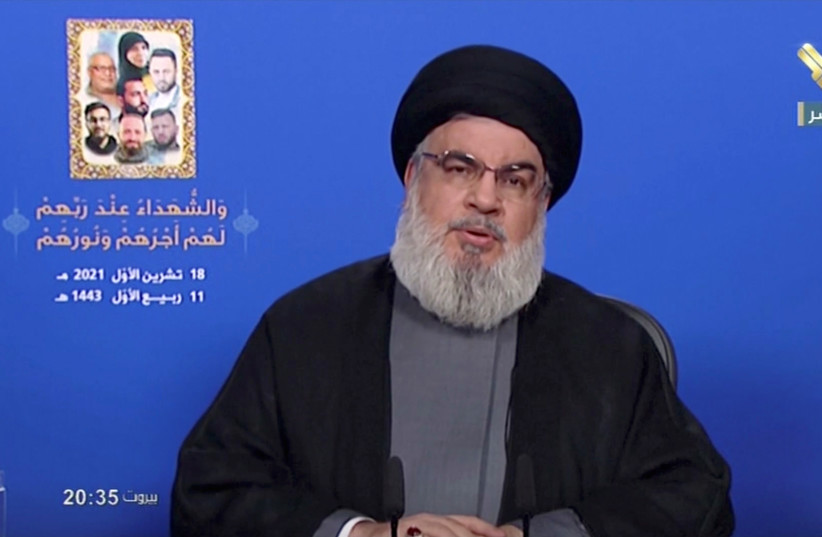Israel made a serious offer to Lebanon and hopes to successfully bring maritime border talks to an end, Energy Minister Karin Elharrar said as US energy envoy Amos Hochstein arrived in Beirut on Sunday.
“We submitted a proposal, a good, serious proposal for Lebanon,” that Hochstein will present on his visit, Elharrar said. “I call on Lebanon to take what is a very significant step for them towards becoming a country that produces gas, in order to solve their economic and energy crisis.”
“I call on Lebanon to take what is a very significant step for them towards becoming a country that produces gas, in order to solve their economic and energy crisis.”
Energy Minister Karin Elharrar
The dispute between Israel and Lebanon on the demarcation of their border in the Mediterranean Sea has – in addition to severe government and economic instability – made it difficult for Lebanon to tap into its natural gas resources. The countries were in on-and-off US-mediated negotiations on the matter since 2020.
Hochstein arrived in Beirut “to discuss sustainable solutions to Lebanon’s energy crisis, including the Biden Administration’s commitment to facilitating negotiations between Lebanon and Israel on the maritime boundary,” according to the US State Department. “Reaching a resolution is both necessary and possible, but can only be done through negotiations and diplomacy.”
Elharrar said Israel’s proposal “can certainly help Lebanon and I’m very hopeful that they will accept it.”
Lebanon-Israel maritime dispute
The minister’s comments came after Lebanese Foreign Minister Abdallah Bou Habib tweeted that “there has never been optimism to the extent that there is today” about the negotiations. Defense Minister Benny Gantz and US Secretary of State Antony Blinken also discussed the talks, among other topics, in a call on Saturday.

Asked if she, too, is optimistic, Elharrar said that “Israel is always optimistic and willing to negotiate. What the other side does is up to them.”
Elharrar declined to share details of Israel’s proposal, saying that doing so could hurt the negotiations.
“All I can say is that the proposal will really allow Lebanon to be a country that produces gas,” she said. “The proposal is a watershed moment for Lebanon to decide whether they want to continue their economic destruction or to turn to development for the benefit of their economy.”
Hezbollah threats against Karish
Lebanon-based, Iran-funded terrorist group Hezbollah recently aired a video of vessels involved in the Israeli offshore oil and gas industry, reiterating its threat of military escalation.
The video begins with the words of Hezbollah leader Hassan Nasrallah during a recent speech in which he warned that “playing with time is not useful” on the maritime issue. It shows the Arendal Spirit platform, Energean Power floating production and storage vessel and Stena IceMax drillship located in Israel’s Karish gas field, as being “within range” of Hezbollah weaponry.
Asked about the video, Elharrar said “Israel is negotiating with the Government of Lebanon and not any other party, and I suggest the State of Lebanon and their citizens understand they have an opportunity here that would be unfortunate to miss.”
In addition, Elharrar “want[ed] to make it as clear and unequivocal as possible that Karish is an Israeli reservoir.”
Even Lebanon’s more extreme claim in the Mediterranean, which it made in 2021, does not encroach on Karish, Elharrar said.
The company that has the license to extract gas from Karish, Energean, “will be able to produce gas for the local and export markets the moment they’re ready. It has no connection to Lebanon,” the minister added.
The dispute between Lebanon and Israel, which began over a decade ago, involves an 860-sq.km. triangle in the Mediterranean Sea, which would be about 2% of Israel’s economic waters. Israel entered the talks agreeing to split the area 58:42 in favor of Lebanon, which would like to start drilling for gas as soon as possible to help dig itself out of its ongoing economic crisis. The talks broke down in 2021 when Lebanon sharply increased its demands after four rounds of US-mediated talks, almost tripling the disputed area to 2,300 sq.km. to include the northern end of the Karish natural gas field.
Energean hooked up a production ship to the Karish gas field, about 80 km. west of Haifa, in June. Lebanese President Michel Aoun claimed that the vessel entered “the disputed maritime area with Israel,” and threatened that, in Beirut’s view, “any action or activity in the disputed area represents a provocation and an aggressive action.”
Nasrallah has threatened to use force against Israeli facilities in the Karish gas field multiple times. The terrorist group leader has made claims to the field on behalf of Lebanon, asserting that it is a "major Lebanese issue."
Hezbollah previously threatened the Karish gas rig with Iranian-made unmanned aerial vehicles. The IDF shot down three drones within Israeli economic waters, using an F-16 on one and by the naval Barak 1 Medium-Range Surface-to-Air Missile system on the INS Eilat on the two others.
Jerusalem Post staff contributed to this report.
